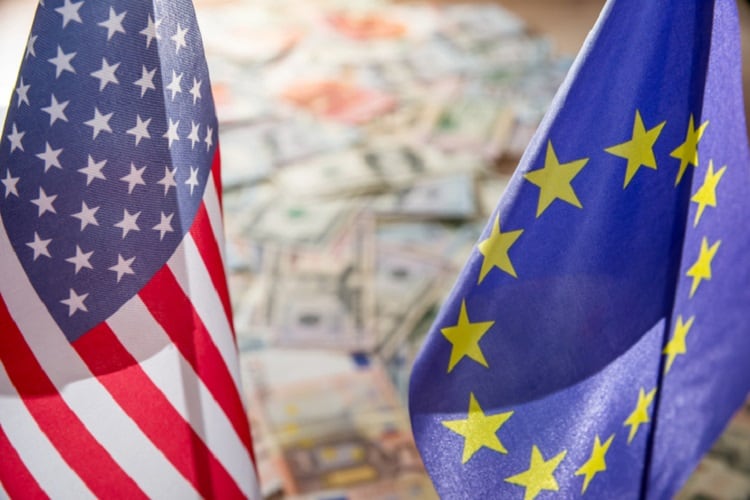Key takeaways
- EU delays retaliatory tariffs again after Trump threatens 30% tariff
- US goods trade deficit with EU saw 2.9 % increase since 2023, according to Office of the United States Trade Representative
- EU exports significant amount of cheese, so tariff could create opportunities for UK cheese exporters
- May also be an incentive for EU companies to offshore manufacturing into UK
- But, the UK still faces a baseline of 10% plus existing tariffs, which may deter trade
- And more competition for British producers may come as a result of tariff wars driving US and EU products into UK
In a letter to European Commission President Ursula von der Leyen, the US president voiced concerns over a trade deficit, stating that the EU will see a 30% tariff imposed on all imports from 1 August 2025 if the EU brings in import duties of its own.
“We must move away from these long-term, large, and persistent, trade Deficits, engendered by your tariff, and non-Tariff, policies, and trade barriers,” Trump wrote.
How much does the US trade with the EU?
The EU is one of the largest trading blocs with the US. According to the European Commission, in 2023, EU-US trade in goods and services reached €1.6 trillion. In 2023, the EU had a trade surplus of €48 billion with the US – the equivalent of 3% of the total trade between the two areas.
And while the European Commission describes trade as “balanced”, Trump says the relationship between the two has been “far from reciprocal”.
According to the Office of the United States Trade Representative, the US goods trade deficit with the European Union was $235.6 billion in 2024 – a 12.9 % increase since 2023.
EU delay retaliatory tariffs
Following the letter, the EU has said it will postpone rolling out countermeasures against the US, which had already been suspended earlier in the year, until August. This will allow time for negotiations to continue.
“The United States has sent us a letter with measures that would come into effect unless there is a negotiated solution,” von der Leyen said.
“We will therefore also extend the suspension of our countermeasures till early August. At the same time, we will continue to prepare further countermeasures so we are fully prepared.”
If introduced these countermeasures would impact around €21 billion in US exports.
UK cheese exports may benefit
“This won’t just hit Brussels, it risks serious collateral damage for UK firms, particularly SMEs and trade with Northern Ireland,” Marco Forgione, director general at the Chartered Institute of Export & International Trade explained.
“If introduced, this will mean a huge shift for supply chains, which are already being buffeted by tectonic geo-political forces.”
Rod Addy, director general at the Provision Trade Federation (PTF), was slightly more optimistic. He explained that on the surface, the US’ “tough stance” could create some opportunities for the UK to supplant EU export business with more competitively priced food alternatives.
“The EU exports a significant amount of cheese to the US, so that could give a boost to UK cheese exporters,” he noted.
More competition
However, he did add that this is only one side of the story: “While the UK faces lower tariffs on food exports than the EU, it still faces a baseline of 10% plus existing tariffs and that may be enough to persuade some to look for alternative markets for their products.
“Some within the EU may be tempted to use the UK as a transit point for further processing products before dispatch to the US as a way of avoiding tariffs, but the US is likely to remain vigilant on this and shut down this tactic swiftly.
“Meanwhile, if the EU ends up facing 30% tariffs or more on most products, it will be exploring alternative markets for those foodstuffs. One of these could be the UK, so domestic producers may well see more competition from EU imports. If the EU chooses markets other than the UK, that could potentially increase competition between the EU and the UK, depending on how active the UK already is in those markets.”
Addy also says that if the EU imposes retaliatory tariffs on US foods it “could force the US to find alternative markets” for these; one of which could be the UK, leading to more US imports hitting UK shelves.
Offshoring opportunities
Meanwhile Alex Altmann, partner and head of Lubbock Fine’s German desk believes the “UK could be a big indirect winner”.
“If the tariff rate for the EU finally ends up anywhere near this 30% level, then the UK’s much lower US tariffs would offer a major incentive for EU companies to shift some of their manufacturing to the UK or to expand their existing UK facilities,” he said.
“The UK has a lot of spare manufacturing capacity after Brexit. A big gap between UK and EU tariffs would be a major opportunity for the UK to regain some of its lost status as a key European manufacturing hub.”
Plan for disruption
Whilst nothing is set in stone yet, Simon Geale, executive vice president at procurement and supply chain consultancy, Proxima, has said businesses must “plan for disruption” during this trade limbo.
“Resilience, flexibility and visibility across supply chains are now more critical than ever,” he added.
This letter from Trump follows a wave of similar ones from the US President to other countries, including to Canada, Japan, Brazil and Mexico.


